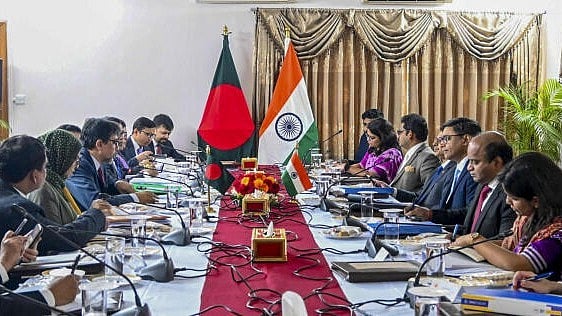
Foreign Secretary Vikram Misri during talks with his Bangladeshi counterpart Mohammad Jashim Uddin and other delegates, amid strained bilateral ties since August following the ouster of prime minister Sheikh Hasina, in Dhaka, Monday, Dec. 9, 2024.
Credit: PTI Photo
New Delhi: India on Monday emphasised the centrality of people in the bilateral relations and expressed its desire to work with the interim government of Bangladesh, underlining that its continued hospitality to the neighbouring country’s deposed prime minister, Sheikh Hasina, would not affect the ties.
Foreign Secretary Vikram Misri, however, brushed aside Dhaka’s displeasure over New Delhi’s comments on the “internal affairs” of Bangladesh to reiterate India’s concerns over the persecution of the minority communities in the neighbouring country.
Dhaka, however, continued to dismiss the allegations of atrocities on the Hindus and other minority communities in Bangladesh as disinformation and exaggeration, particularly by the media in India. The foreign secretary of India called on Muhammad Yunus, the chief advisor of the interim government of Bangladesh.
The government is committed to ensuring the safety and security of the people of Bangladesh, irrespective of their faiths, religions, and ethnicities, Yunus told Misri on Monday. He also underlined that Sheikh Hasina’s statements from India created tension in Bangladesh.
“I emphasized that India desires a positive, constructive, and mutually beneficial relationship with Bangladesh,” Misri told journalists after he and his counterpart Mohammed Jashim Uddin chaired the bilateral Foreign Office Consultation in Dhaka. “We have always seen in the past and we continue to see in the future this relationship as a people-centric and people-oriented relationship; one that has the benefit of all the people as its central motivational force.”
His comment subtly indicated that New Delhi would not want the fall of Sheikh Hasina’s Awami League government on August 5 to cast a shadow on its ties with Dhaka and India would like to continue its trade and development partnership as well as security cooperation with Bangladesh for the benefit of the people of the two nations.
Hasina’s political opponents accused her of running the government in Dhaka according to the diktat from New Delhi and of giving India’s interests primacy over the interests of Bangladesh while managing the bilateral relations with India. The Awami League’s arch-rivals Bangladesh Nationalist Party and Bangladesh Jamaat-e-Islami as well as other radical organisations of late raised the pitch of rhetoric against India.
Misri sought to ease the strains in the ties between New Delhi and Dhaka.
“There is no reason why this mutually beneficial cooperation should not continue to deliver in the interest of both our peoples. And, to that end, therefore, I have underlined today India's desire to work closely with the interim government of Bangladesh,” he said.
Hasina had flown to an Indian Air Force base near New Delhi on August 5 just before the protesters, agitating against the crackdown on the students and youths demanding an end to reservation in government recruitments, had stormed into her official residence.
An interim government led by economist Muhammad Yunus succeeded the Awami League’s regime on August 8.
Hasina, the daughter of Bangabandhu Sheikh Mujibur Rahman, and her family have a special relationship with New Delhi that dates back to 1971 when the Indian Army defeated the Pakistan Army and helped liberate East Pakistan into Bangladesh.
Jashim Uddin on Monday quoted Misri telling him that New Delhi would work with “the government of the day” in Dhaka and Hasina’s stay in India would not have any bearing on its bilateral relations with Bangladesh.
The foreign secretary of the Government of Bangladesh also conveyed to his counterpart from New Delhi the concerns of Dhaka about the political statements the deposed prime minister was making from India.
Hasina of late accused Yunus of masterminding the unrest in July and August leading to the fall of her Awami League government.
The relations between New Delhi and the interim government in Dhaka came under stress in the wake of protests in India against the atrocities on Hindus in Bangladesh, particularly after the arrest of a monk Chinmay Krishna Das Brahmachari, who had emerged as a front-line leader of the protest against the atrocities on the minority community in the neighbouring country. Dhaka recalled its diplomats heading Bangladesh’s Deputy High Commission in Kolkata and Assistant High Commission in Agartala in view of the aggressive protests in front of the missions.
“We also had the opportunity to discuss certain recent developments and issues, and I conveyed our concerns, including those related to the safety and welfare of minorities,” Misri told journalists after his meeting with Jashim Uddin.
“We also discussed some regrettable incidents of attacks on cultural, religious, and diplomatic properties. We expect, overall, a constructive approach on all these issues by the Bangladesh authorities, and we look forward to moving the relationship forward in a positive, forward-looking, and constructive direction,” he added.
Yunus told Misri that he would expect India to join Bangladesh and other South Asian nations to revive the SAARC. He also sought to strengthen Bangladesh-India cooperation for the management of water resources and for the prevention of floods.
